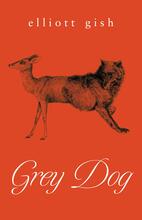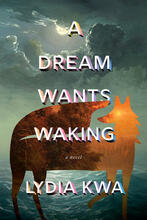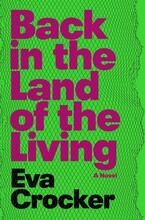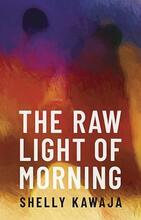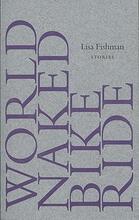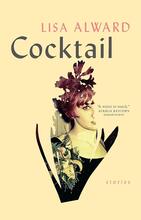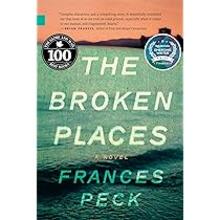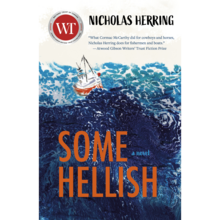Fiction Reviews
Posted on January 14, 2025
Little Deaths, Big Voices
Anna Ling Kaye Reviews Denison Avenue by Christina Wong and Daniel Innes
Posted on July 9, 2024
Simple Power: Representation and Resilience in Denison Avenue
Denison Avenue, Christina Wong and Daniel Innes. ECW Press, 2023.
“Lay mang mang, ah See Heeei,” Mrs. Wong’s voice rang out. (Take your time.)
thom vernon Reviews Pervatory by RM Vaughan
Posted on July 4, 2024
Love and Demons thom vernon's review of Pervatory by RM Vaughan. Coach House Books, 2023.
In Pervatory, the posthumously published last novel by the spectacularly talented RM Vaughan (Richard Murray Vaughan), the iconic queer multi-hyphenate (think novelist, poet, filmmaker, critic, essayist, playwright, and visual artist — squirrel saloons made of pizza...
Manahil Bandukwala: Love as a Driving Force. Rewview of A Dream Wants Waking by Lydia Kwa
Posted on April 25, 2024
Love as a Driving Force by Manahil Bandukwala
A Dream Wants Waking, Lydia Kwa. Wolsak & Wynn, 2023
Lydia Kwa’s A Dream Wants Waking promises a dreamlike narrative through its title and cover, and the short novel certainly delivers. The book opens with a list of characters from the past timeline in Tang China from 644-904 CE and the present timeline of Luoyang in 2219 CE. Told through short chapters that switch back and forth at a rapid pace, Kwa immediately immerses the reader into both timelines of the story.
Review of Back to the Land of the Living by Eva Crocker
Posted on March 22, 2024
Editorial assistant Tommy Duggan reviews Back to the Land of the Living by Eva Crocker (Anansi, 2023)
Eva Crocker’s Back to the Land of the Living begins with our protagonist Marcy Pike moving to pre-COVID Montreal from St. John’s on a journey of self-discovery and newfound independence.
Chris Benjamin: A Richly Layered Study of Poverty and Trauma, Review of The Raw Light of Morning by Shelly Kawaja
Posted on December 19, 2023
The Raw Light of Morning, Shelly Kawaja’s debut novel and winner of the $12,500 BMO Winterset Award in 2022 for outstanding literary work by a Newfoundlander or Labradorian, is at the same time a compelling story of domestic violence, poverty, and trauma, and a 1990s western Newfoundland coming-of-age character study of a young woman of remarkable resilience. This is Laurel’s story, and she is 14 in the opening scene, and forced to intervene to protect her mother from life-threatening violence.
Carol Bruneau: Writing Bareback Review of World Naked Bike Ride by Lisa Fishman
Posted on December 19, 2023
Who can resist the title of this debut short fiction collection? Like cyclists in the eponymous event — a protest against fossil fuel consumption, among other things — Lisa Fishman’s 40 pieces, a collage of micro, flash fiction and narratives of greater length, flout convention. Vanity of vanities, the Pushcart Prize-nominated poet seems to say of the standard short story and its clothing/trappings.
Clarissa Hurley: Squinting Through the Smoke, Review of Cocktail by Lisa Alward
Posted on December 19, 2023
The epigraph to Lisa Alward’s new story collection, Cocktail, is an epiphanic moment from Virginia Woolf ‘s To the Lighthouse, in which the artist Lily Briscoe strives to resurrect and memorialize her dead friend through painting her portrait. Moved to uncharacteristic emotion by a sudden realization of the brevity of life, Lily laments, “Was there no safety? No learning by heart of the ways of the world?
Ian Colford: A Tragedy of Colossal Proportions, Review of The Broken Places by Frances Peck
Posted on October 26, 2023
The natural disaster has been a trope in fiction (and movies) for decades. Usually what happens is that a group of strangers becomes isolated by an unexpected and massively destructive event. The ensuing drama chronicles the efforts of the unlucky individuals to cope with the challenges, dangers and deprivations they suddenly find themselves facing.
Rebecca Geleyn: Lobster Men, Review of Some Hellish by Nicholas Herring
Posted on September 22, 2023
In Nicholas Herring’s first novel, his self-named protagonist, Herring, makes the following socioeconomic comment about lobsters: “You know, it wasn’t too long ago, you couldn’t get anybody to buy lobster. People used it as fertilizer in their gardens. Farmers would put it out on their rows. Eighty per cent of the market nowadays is cruise ships and casinos. The way I see it, lobster is just something people eat to distract them from the fact that they’re pissing their wages away” (260).
